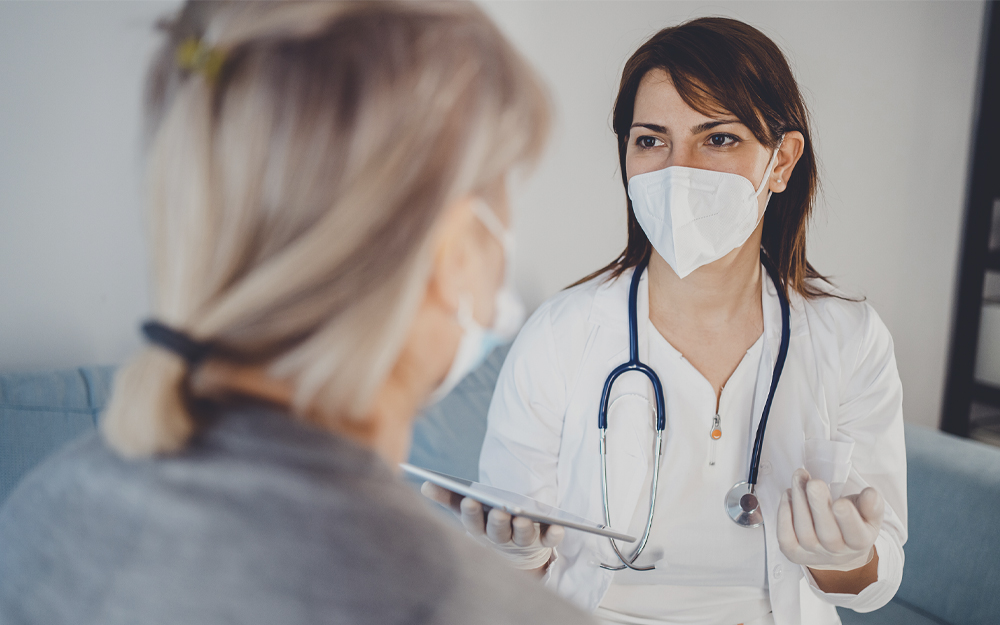Should I Get a Second Opinion for Endometriosis?
Date
March 15, 2023
Credits

Date
March 15, 2023
Credits
Medical providers featured in this article

In Brief
{{cta-block}}
If you’re diagnosed with endometriosis or uterine fibroids, you may be frustrated by your treatment options. For the countless patients who find themselves in this situation, a second opinion could change everything.
Thanks to the Virtual Second Opinion platform, women who live in certain states can now connect with a Cedars-Sinai expert via video visit. During this visit, they can receive a detailed second opinion report and discuss minimally invasive surgery options, even for complex cases of endometriosis and uterine fibroids.
"We often see patients with difficult cases who either self-refer or are referred to us by their doctors, and we have been providing second opinions for a long time."
We assembled frequently asked questions and got answers from Dr. Matthew Siedhoff, vice chair of Gynecology at Cedars-Sinai and an expert in minimally invasive surgery for endometriosis, fibroids, ovarian cysts and other gynecologic conditions.
{{providers}}
In Discoveries: The Unfair Sex
What are the advantages of a virtual second opinion compared to an in-person second opinion?
Dr. Matthew Siedhoff: One big advantage is patients can see the specialist they want even if they can’t travel. A patient may have a very good doctor who simply doesn’t have advanced knowledge in the subspecialty in question.
For in-demand doctors with full schedules, it’s also easier to get a virtual consultation than to schedule an office visit. Office visits take more time, partly because they have particular requirements. For example, the care team has to record a patient’s vitals, such as blood pressure and heart rate, at each appointment. When the team doesn’t need to set aside time for such requirements and it doesn’t need a location with the right equipment and staff, a virtual visit can be scheduled in a timelier manner.
Patients can easily have a loved one join them for an online appointment. You can have the doctor, the patient and the patient’s friend or relative taking part in the visit even if they live in three different parts of the country. Loved ones don’t just offer moral support. They can offer invaluable help, such as taking notes or asking questions. That’s especially important if the patient is feeling overwhelmed or confused, which can happen when facing a health challenge.
Why is a platform like Cedars-Sinai’s Virtual Second Opinion particularly useful for women’s health?
MS: There are several OB-GYN conditions that are underdiagnosed, which can cause women to suffer needless pain and frustration. Endometriosis can be hard to diagnose—or easy to misdiagnose. It also can be very painful and negatively impact the patient’s quality of life. In some cases, patients get the right diagnosis but aren’t offered the full range of options we can offer here.
The women’s health specialists at Cedars-Sinai have a great deal of expertise and experience in minimally invasive surgery. We often see patients with difficult cases who either self-refer or are referred to us by their doctors, and we have been providing second opinions for a long time. Women who have virtual appointments with us often become Cedars-Sinai patients precisely because we offer minimally invasive surgery even for difficult conditions and can deliver advanced care in state-of-the-art facilities.
For what conditions would you recommend patients seek a second opinion with a Cedars-Sinai women’s health expert?
MS: Endometriosis is very much underdiagnosed, and it is the most complex of the noncancer OB-GYN conditions. A virtual second opinion can make such a difference. When patients come to us for an online visit, the imaging, lab tests, physical exam and other in-person tasks have already been done.
That usually gives us a good basis to begin forming an opinion and recommending next steps, including surgery when appropriate. Proper treatment requires a dedicated program, such as Cedars-Sinai’s Endometriosis Program, and specialized surgeons with a lot of experience, judgment and skill.
Uterine fibroids pose a somewhat different problem, although optimal treatment also requires a high degree of specialization and knowledge. Many women with uterine fibroids are correctly diagnosed, but they often aren’t made aware of all their treatment options.
When surgery is recommended, the patient may want a procedure that leaves the uterus in place, but not every provider will offer this approach even though uterine fibroids are quite common. They may operate with a large, open incision, and the patient may face a long hospital stay and lengthy recovery. We can frequently offer minimally invasive surgery—even for large and difficult fibroids.
Can you recall a case where your second opinion made a real difference in the outcome?
MS: I recently had a patient with significant endometriosis that had not been discovered. We reviewed her medical history and realized the previous provider had not ordered enough imaging.
She obtained the necessary images and found that the patient’s endometriosis was more extensive than previously thought. We performed the surgery, which was complex due to the advanced nature of her condition. The procedure was very successful. For this patient, getting a second opinion was life changing.
In Discoveries: Unlocking the Mysteries of Endometriosis
What would you tell a patient who is hesitant to seek a second opinion because they think it might upset their current doctor?
MS: No respectable doctor is upset by this. When we offer a second opinion, we maintain a good relationship with our patient’s initial doctor, as long as the patient authorizes us to reach out. We see ourselves as an extension of the initial provider. If that provider disagrees, we are happy to talk with them respectfully and share whatever the patient is comfortable with us sharing.
Start your Virtual Second Opinion with a Cedars-Sinai Women's Health Expert





